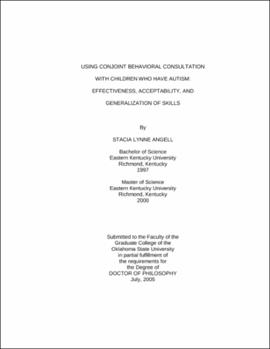| dc.contributor.advisor | Duhon, Gary J. | |
| dc.contributor.author | Angell, Stacia Lynne | |
| dc.date.accessioned | 2013-11-26T08:34:07Z | |
| dc.date.available | 2013-11-26T08:34:07Z | |
| dc.date.issued | 2005-07 | |
| dc.identifier.uri | https://hdl.handle.net/11244/7292 | |
| dc.description.abstract | Scope and Method of Study: The conceptual bases of the Conjoint Behavioral Consultation (CBC) model suggest potential for positive outcomes when used with parents and teachers of children with autism. Thus, the purpose of this study was to investigate the effectiveness of CBC in promoting the success of elementary and secondary school age children with an IDEA eligibility of autism when addressing behavioral excesses in the special educational classroom, regular education classroom, and the home. In addition, programming the generalization of skills across settings was investigated. Lastly, the acceptability of the CBC model and the interventions derived from the model were investigated. Participants in the study were 6 children from an urban school district in the Midwest with an IDEA eligibility of autism, their special education teacher, general education teacher, and parents. For the six cases in this study, behavioral excesses were identified and interventions designed to reduce the overall occurrences of these excesses were developed and implemented in the special education classroom. A partial form of the full intervention that was implemented in the special education classroom (training setting) was implemented in the general education classroom and home settings (generalization). Programming common stimuli was the method used for generalization purposes. | |
| dc.description.abstract | Findings and Conclusions: Based on the data from this study, there is evidence that the application of consultation is an effective service delivery model for children with autism. Furthermore, there is evidence that the application of the CBC model is an effective service delivery model for children with autism. In addition, there is evidence that generalization can be programmed across settings to reduce behavioral excesses. Lastly, there is evidence that the CBC model, as well as the interventions derived from the model, are acceptable to parents and teachers of children with autism. | |
| dc.format | application/pdf | |
| dc.language | en_US | |
| dc.rights | Copyright is held by the author who has granted the Oklahoma State University Library the non-exclusive right to share this material in its institutional repository. Contact Digital Library Services at lib-dls@okstate.edu or 405-744-9161 for the permission policy on the use, reproduction or distribution of this material. | |
| dc.title | Using conjoint behavioral consultation with children who have autism: Effectiveness, acceptability, and generalization of skills | |
| dc.contributor.committeeMember | Stinnett, Terry A. | |
| dc.contributor.committeeMember | Harrist, Steve | |
| dc.contributor.committeeMember | Davis, Charles Robert | |
| osu.filename | Angell_okstate_0664D_1414 | |
| osu.accesstype | Open Access | |
| dc.type.genre | Dissertation | |
| dc.type.material | Text | |
| thesis.degree.discipline | School Psychology | |
| thesis.degree.grantor | Oklahoma State University | |
